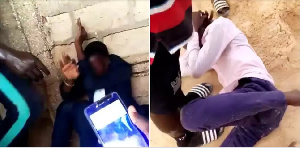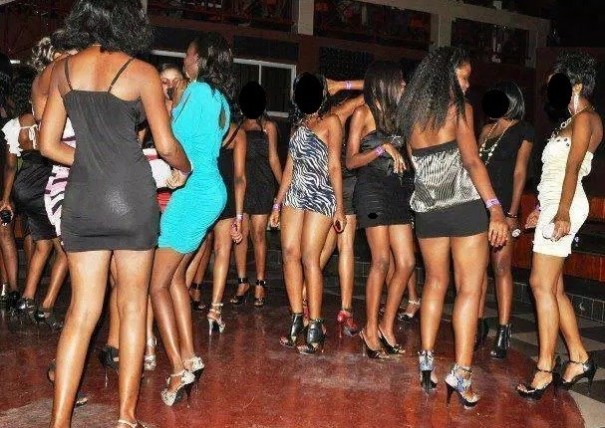Terror sweeps Senegal’s gay community after a series of assaults

Videos have documented at least four men being assaulted and detained in Senegal since May 23, when a conservative group held a large rally calling for homosexuality to be classified as a more serious crime.
Activists say that over the last three weeks at least 150 gay men have received threats, causing some to flee their homes. Our Observer says that panic is gripping Senegal’s small and often underground gay community.
The four videos showing men being assaulted were filmed between June 6 and June 9. We will only publish screengrabs of the videos, to protect the survivors’ identities.
On June 6, a group of men surrounded a teacher. In the video, you can hear the aggressors threatening to “cut off his testicles” in order to “make him a woman.”
The next day, another man was assaulted in the Yoff neighbourhood of Dakar after locals saw him in the company of another man, who is known locally to be gay. While the local man was able to flee, the aggressors pushed the victim to the ground, beat and whipped him.
The same day, another man was arrested while getting out of his car near Dakar’s coast. He was apparently wearing a short tunic that revealed his legs, which led to people calling him a “goorjigéen”, a term that means “man-woman” in Wolof, the national language of Senegal. A crowd surrounded the man before the police arrived and arrested him.
Finally, on June 9, a young man in Ziguinchor, in Senegal’s Casamance region, went to meet someone he had met online, only to discover it was a trap. The video of the incident shows four men and at least one woman attacking him.
In the video, you can hear the voice of a woman, off-camera, who says that they should undress him so that they can cut off his testicles because he isn’t capable of being a man as God designed him. The crowd rip off the man’s tee shirt and then start pummelling his head and face before forcing him to do push-ups.
The police arrested all of the victims seen in these videos. According to our Observer, they were all still in detention when the original version of this article (in French) was published on June 11.
The Senegalese penal code refers to homosexuality as an “indecent act or an act against nature with an individual of the same sex,” punishable by up to five years in prison. The most recent assaults have taken place in an ongoing climate of violence and hostility towards gay people in Senegal.
On May 23, a collective connected to an Islamic organisation held a large protest, calling for homosexuality to be classified as a more serious crime, punishable by up to ten years in prison.
During this protest, as in recent public speeches and several online petitions, certain people called for gay people to be “burned.”
Our team spoke to Alexandre Marcel, the president of the IDAHO France Committee, which works to combat homophobia. He says that, since May 23, his partner organisation Afrique Occident Solidaire [Solidarity West Africa], has received between “500 and 600 calls” from men who say that they are gay, living in Senegal and in need of help. Of those, he estimates “150 are credible.” The two organisations are working to support the people who they say have been under increased threat since May 23.
‘Since May 23, the climate here has been horrible’
Two people who survived homophobic attacks spoke to our team, via Afrique Occident Solidaire. One said that he had received threatening and insulting calls from a private number. He also said he had been hit several times in the street.
The other man told us more about his experience. “When my family found out that I was gay, they burned my room, saying that it was ‘haram’ [Editor’s note: a term that refers to the concept of sin in Islam].
“I fled to another town. I rented a room and I pay for it as I can. Since May 23, the climate here has been horrible. People think that gay people are like wild animals. In the street, we get more looks than before, which makes me even more scared. I try to dress differently, to be discreet.”
‘The only way for these men to get out of prison is to know someone with connections’
Prudence is an association that tries to provide help and support to gay people living in Senegal. Association president Djamil Bagoura, who himself has been assaulted several times, spoke to the FRANCE 24 Observers team:
All of these cases are similar. People thought the victims seemed gay. A man who is arrested and handed over to the police just because someone suspects he is gay almost always goes to prison, sometimes for up to six months.
By law, homosexuality is considered an unnatural act. There is almost no way to escape a conviction. In other cases where there is actual ‘proof’ that a man has committed a homosexual act – for example, if he was seen being sexually active with another man – he might be sentenced up to five years in prison.
The only way for these men to get out of prison is to know someone with connections – an outside intervention.
‘Either you leave or you get killed’
“The people who contact us tell us that they have been threatened in their neighbourhoods. People say, ‘either you leave or you get killed.’ People with financial means leave Senegal and move to Mauritania or Gambia.
“Others leave their homes and their neighbourhoods but stay in Senegal. They have to abandon everything.”
For those who have the means to flee, we tell them to be as discreet as possible, to try and change their behaviour, to not wear clothes that people associate with the gay community and to avoid visiting some lower class neighbourhoods, for example, those located in Dakar suburbs.
“I don’t think that things are going to calm down. On Wednesday, June 9, there was another vitriolic debate against homosexuality broadcast on television.
“Considering the upcoming presidential election in 2022, I don’t see that ending any time soon. Our only hope is that other countries will intervene when they hear our call for help.”
Over the past few years, a number of videos showing similar assaults have circulated in Senegal. There have also been a number of protests against homosexuality, notably in 2015.
Asked in February if there was a possibility that homosexuality would be legalised, Senegalese president Macky Sall said: “That’s not possible because our society won’t accept it. Society will evolve and it will take the time it takes. Each country has its own metabolism.”
Source: france24.com






